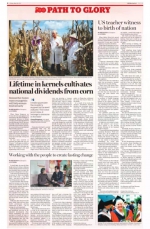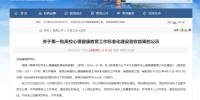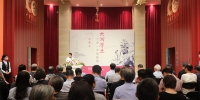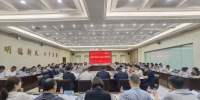US teacher witness to birth of nation
Shirley Wood celebrates students' graduation at Henan University's Minglun campus in Kaifeng, Henan province. CHINA DAILY
When Shirley Wood, 96, moved to her Chinese husband's homeland from the United States to become a housewife 75 years ago, it was the beginning of a grand adventure.
While quiet domesticity isn't usually the acme of excitement, it was the relatively alien character of the culture in which she immersed herself that made the move magical.
Then, as now, the sight of an American woman living in a two-story home in the ancient city of Kaifeng, Henan province, was unusual.
"Living as a housewife in China has allowed me to better understand the country," Wood said in the local dialect.
"Kaifeng is my home. Life is comfortable here."
She said the city has retained its traditional appeal amid modernization. Part of this, Wood said, is the sense of community. She spends much of her time chatting with elderly neighbors.
"Here, if you live on a street for a while, you are already a 'laodajie (older sister)'," she said, smiling.
"That's what I like about China. You never feel lonely because people are friendly."
But Wood has done more with her time than just look after her family and make friends with neighbors.
Wood, a retired Henan University professor of English language and literature more commonly known by her Chinese name Wu Xueli, has devoted herself to education, translation and communication between China and the West.
She has written about China for Western newspapers and publishers for decades.
Her publisher called her first novel, A Street in China, which was released in 1958, a "picture of everyday life in Communist China by an American who lives the life of a Chinese housewife and mother".
In 1988, she was invited to translate the premier's and vice-premier's reports at the Seventh Session Meeting of the National People's Congress.
"It was much less interesting than translating literature," Wood said. "There was a lot of political language. The words sounded nice in Chinese but become a little awkward when translated into English."
It was trickier to find precise translations for terms that appeared after reform and opening-up, but some of Wood's choices have become international standards.
Her greatest passion remains education. She spent more than half a century as a teacher and was witness to the transformation of education in the country.
The closeness of the student-teacher relationship impresses her the most.
"Here, teachers are the students' parents away from home, and the students are very considerate of their teachers," she said.
Wood remembered that educational conditions were dire when she first arrived. Many of her students were from the countryside, and had never studied foreign languages.
As a teacher of oral English, she used various methods to make her classes more fun, including games, storytelling and outdoor activities.
She also recalled spending part of the semesters during the Great Leap Forward (1960-62) digging ditches and cutting wheat in rural areas.
"The rests and mealtimes provided good opportunities to speak a little English. I would then begin to tell my students some stories."
Life wasn't easy when her husband took a job in the suburbs of Kaifeng. They had to walk for an hour along a dirt road to reach the city gate.
Before moving to Kaifeng, the family spent several years in Shanghai and in Shaanxi's provincial capital Xi'an.
Their suburban home lacked running water, so they had to fill the home's water tank bucket by bucket. They also had to mix loose coal with clay to heat the stove.
"The biggest differences for a housewife are always related to the kitchen," Wood said.
She had to sew most of her family's clothes because there were few manufactured garments available for sale.
"At the time, living standards were simpler. People could make do with fewer conveniences," Wood said.
She talked about her youth, as her great-grandson sat on her lap.
Wood persuaded her mother to come and live with her in China, and five of her six children have emigrated to the US. She visits them for a few months every couple of years.
The Arkansan native moved to China a year after she married her veterinarian husband, Huang Yuanbo, at the age of 20.
She was surprised by what she saw upon arrival. It differed from what she had imagined, since, as a girl, she'd read Young Fu of the Upper Yangtze, a novel about a young boy in what is today's Chongqing municipality.
"I'd expected people in colorful clothes, and they were actually all dressed in blue and black," Wood said, laughing.
She also remembered the excitement of being among the few foreigners to witness New China's founding in 1949.
"Tailors and anybody with a sewing machine were making red flags, often working through the night," she says. "I was worried I might not get one, because everyone wanted them."
Eventually, she got a flag from a local women's association on the eve of the birth of the People's Republic of China, and she has hung it outside every National Day since.
"It should have its day in the sun," she says. "It's more than 70 years old now."
In 1975, Wood became a citizen of the country whose founding she witnessed, thanks to a written order from former premier Zhou Enlai.
"I was very happy to become Chinese," she says. "After living here for so long, I no longer feel like an outsider."
Henan University held a seminar on Wood's approach to didactics and educational philosophy in celebration of her 95th birthday.
Guan Hefeng, an English teacher at the university, spoke on behalf of the elderly teacher at the seminar, saying that Wood appreciated "the approval the country and the university had given her, and the care, support and help different generations of presidents of the university and the directors of the foreign language school had given her as well."
In the course of her lengthy career, Wood taught more than 3,000 undergraduates and over 300 graduate students.
Liu Xiangrui and Yang Xiaonan contributed to this story.
https://www.chinadaily.com.cn/a/202105/28/WS60b04b60a31024ad0bac2070.html







